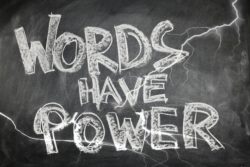 Here are 20 fascinating facts about the history of the English language. If you have heard me speak, you have probably already heard some of these (just a warning):
Here are 20 fascinating facts about the history of the English language. If you have heard me speak, you have probably already heard some of these (just a warning):
- According to Global Language Monitor, the estimated number of words in the English language is 1,025,109. There is some controversy over that exact figure, but it’s safe to say there are over a million.
- There is actually something called the Society for the Promotion of Good Grammar. It was founded by Martha Brockenbrough, who designated March 4 as National Grammar Day in 2008.
- English is a hodgepodge of many languages: Latin, Greek, French, German, Dutch, and others.
- Chaucer was the first writer who chose to write in English, although it is an English that might sound pretty foreign to us.
- Shakespeare is probably the most famous person to write in English. He added many words and idioms to the language including these: it’s Greek to me, salad days, vanished into thin air, refuse to budge an inch, green-eyed jealousy, tongue-tied, fast and loose, tower of strength, in a pickle, knitted your brows, slept not a wink, laughed yourself into stitches, the long and short of if, foul play, without rhyme or reason, dead as a door nail, and laughing stock.
- Shakespeare had one of the largest vocabularies of any English writer at about 30,000 words. Estimates of an educated person’s vocabulary today is half that, or 15,000.
- The book generally regarded as the first English dictionary was published in 1604 with only 120 pages; it was called A Table Alphabetical, written by Robert Cawdray, a schoolmaster and clergyman containing “hard words for ladies or other unskillful persons.”
- The first “real” dictionary was published in 1755 and was written by Samuel Johnson. A Dictionary of the English Language, sometimes published as Johnson’s Dictionary, is among the most influential dictionaries in the history of the English language.
- Webster published his first dictionary in 1806, having written some grammar and spelling books before that.
- Gadsby, a book written by Ernest Vincent Wright, has over 50,000 words in it (about 250 pages), none of which contain the letter e! And you can get it on Amazon for about 7 bucks.
- China has more English speakers than the United States.
- A new word is added to the English language every two hours, and about 4000 new words are added to the dictionary every year.
- Since 2001, English has been the official language of all international air travel, regardless of the nationality of the pilots.
- In its earliest known written record, the English alphabet had 29 letters.
- Samuel Johnson left the letter X out of his dictionary, claiming that X “begins no word in the English language.”
- One-fourth of the world’s population speaks at least some English.
- The United States doesn’t have an official language.
- Engish is the only major language that doesn’t have any organization guiding it. French has the Académie Française, Spanish has Real Academia Española, and German has Rat für Deutsche Rechtschreibung. These organizations are responsible for controlling the evolution of their respective language in terms of usage, vocabulary, and grammar.
- English is the official language of 67 countries and the third most commonly spoken language in the world (the first and second are Mandarin Chinese and Spanish). The closest languages to English are Dutch and West Flemish.
- Over 80% of the information stored on computers worldwide is in English.
Grammar Diva News
I will be a coach at the Redwood Writers Conference – Pen to Published – on Saturday, April 21. M y areas of expertise are editing/grammar and self-publishing.
Girls of a Feather, my novel (republished this year under this new name) is available for free in installments on Wattpad. After I post some of the book, it will be available in its entirety on Kindle at a really low price. I will let you know when it is released, so you can add it to your beach-reading list.
I am currently working on my next book, To Comma or Not to Comma: The Best Little Seriously Funny Punctuation Book Ever! (or something like that)
Check out all my books on Amazon (or wherever else you like) and if you own one or two, reviews are always greatly appreciated.



Dear Diva,
With respect to item 19: “… The closest languages to English are Dutch and West Flemish.”, I think that Frisian should not be forgotten. It is a universally acknowledged language and belongs together with English to the Anglo-Frisian language group. Hence, it is more closely related than Dutch itself.
The following famous saying in Frisian could easily (ah, well …) be understood by anglophones:
“Bûter, brea en griene tsiis, wa dat net sizze kin is gjin oprjochte Fries.”
Alright, you win:
“Butter, bread and green cheese, who [that not say can] is no upright Frisian.”
Works, doesn’t it?
Thanks for that info. I am no linguist (wish I were), so I just tells it as I read it! I appreciate the added knowledge!